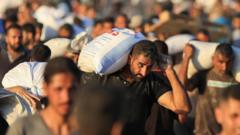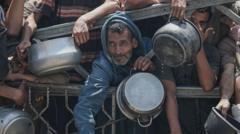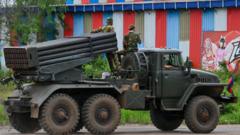A UN-backed report reveals a dire humanitarian situation in Gaza, with malnutrition and starvation increasingly prevalent as the conflict continues. Immediate action is urged to alleviate the suffering of affected populations.**
UN Warns of Famine Conditions in Gaza Amid Ongoing Humanitarian Crisis**

UN Warns of Famine Conditions in Gaza Amid Ongoing Humanitarian Crisis**
Experts indicate that critical famine thresholds have been breached in Gaza, exacerbated by conflict and stringent blockades.**
The Integrated Food Security Phase Classification (IPC), backed by the United Nations, has issued a grave warning that famine-like conditions are currently occurring in the Gaza Strip. According to their latest alert, the evidence of rampant malnutrition, widespread starvation, and escalating disease prevalence points to a humanitarian disaster impacting the 2.1 million residents of the region.
The report highlights that significant famine thresholds regarding food consumption and acute malnutrition have already been met in various parts of Gaza, particularly in Gaza City. UN officials have condemned the situation, insisting that a severe humanitarian crisis is unfolding, with at least 63 deaths attributed to malnutrition reported in recent weeks. "The reality in Gaza is that mass starvation is man-made and in progress due to blockades and hostilities," stated UN Secretary General António Guterres.
Israel's blockade instituted in March, accompanied by military operations against Hamas, has resulted in dire shortages of essential supplies, including food, water, and medical assistance. Though the Israeli government has made recent adjustments to allow some aid to enter, report states these measures have fallen short of meeting the overwhelming needs of Gazans.
Analysts indicate that for an official famine declaration to occur, certain criteria must be met, such as significant percentages of the population facing extreme food shortages and high rates of child malnutrition. Current assessments indicate that an alarming number of those in Gaza are experiencing acute hunger and malnutrition, particularly among children under five years of age.
The IPC's findings emphasize the need for a revitalization of humanitarian efforts to combat the deepening crisis. The report underscores that immediate cessation of hostilities is essential to facilitate an extensive and unobstructed flow of humanitarian aid necessary to mitigate the high levels of distress being faced by the citizens of Gaza.
International organizations like the World Food Programme and Unicef have warned that two critical famine thresholds have been crossed, making it increasingly difficult to collect reliable data on starvation-related deaths under the current conditions. Tragically, this includes reports of hundreds of children facing severe malnutrition, compounded by logistical barriers and devastation to healthcare infrastructure.
Despite assurances from Israeli officials that aid is being facilitated, residents report witnessing minimal improvements in food availability. Instances of looting and extortion further complicate the distribution of aid, worsening the humanitarian situation. Many families find themselves resorting to desperate measures for basic sustenance as they continue to await promised assistance that has yet to materialize in adequate forms.
Amidst the chaos, testimonies from Gaza residents reflect the spiraling challenges faced by families struggling to secure food, as stories emerge of individuals paying exorbitant prices for stolen supplies. As tensions rise and the conflict persists, humanitarian experts continue to call for an immediate ceasefire and significant interventions aimed at restoring essential services and supplies to the beleaguered population of Gaza.




















